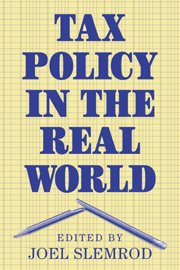Book contents
- Frontmatter
- Contents
- List of contributors
- 1 The real world of tax policy
- 2 Federal tax reform
- The corporate income tax: economic issues and policy options
- Changing views of the corporate income tax
- The American retail sales tax: considerations on their structure, operations, and potential as a foundation for a federal sales tax
- Would tax evasion and tax avoidance undermine a national retail sales tax?
- Life under a personal consumption tax: some thoughts on working, saving and consuming in Nunn-Domenici's tax world
- Living with the flat tax
- The international implications of consumption tax proposals
- 3 Federalism and subfederal taxes
- 4 Principles, politics, and the professors
- Index
Would tax evasion and tax avoidance undermine a national retail sales tax?
Published online by Cambridge University Press: 01 June 2010
- Frontmatter
- Contents
- List of contributors
- 1 The real world of tax policy
- 2 Federal tax reform
- The corporate income tax: economic issues and policy options
- Changing views of the corporate income tax
- The American retail sales tax: considerations on their structure, operations, and potential as a foundation for a federal sales tax
- Would tax evasion and tax avoidance undermine a national retail sales tax?
- Life under a personal consumption tax: some thoughts on working, saving and consuming in Nunn-Domenici's tax world
- Living with the flat tax
- The international implications of consumption tax proposals
- 3 Federalism and subfederal taxes
- 4 Principles, politics, and the professors
- Index
Summary
Abstract - A national retail sales tax has surfaced as a potential replacement for the current system of federal income taxation. A primary concern is that the revenue-neutral required tax rate may easily exceed 30 percent, leading to tax base erosion through widespread avoidance and evasion. This paper examines specific avenues for avoidance and evasion for both firms and individuals under a comprehensive national sales tax and discusses implications for the underground economy. The analysis shows that opportunities for avoidance and evasion will be sustained, not eliminated, by a change in tax structure. Unfortunately, lack of experience in administering a high-rate, indirect tax system precludes definitive statements regarding the likely extent of tax base erosion under a national sales tax.
INTRODUCTION
The current regime of personal and corporate income taxation evokes strong criticism. The income taxes give rise to substantial efficiency losses, administrative and compliance costs are viewed as excessive, and the IRS is perceived by many to be overly intrusive. The search for potential replacements to the federal system of income taxation has led many in the direction of some form of broad-based consumption tax, ranging from a value-added tax (VAT) (and its close cousins, the various flat taxes) to a national retail sales tax (NRST).
Until recently, there was little serious discussion of an NRST as a replacement for the personal and corporate income taxes. An important reason for the shift in sentiment in favor of an NRST is the growing perception of success of state/local governments in administering the current retail sales tax.
- Type
- Chapter
- Information
- Tax Policy in the Real World , pp. 61 - 76Publisher: Cambridge University PressPrint publication year: 1999
- 3
- Cited by



